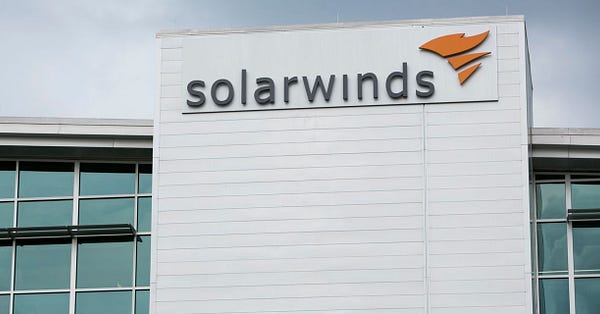A daring cyber assault, Greenpeace's seabed warning, China's lunar mission and celebs on demand
14 - 20 December 2020
It’s nearly Christmas!
CYBER ASSAULT
Public authorities and private enterprises in the US are unravelling a sprawling cyberespionage operation. It's emerged that various federal agencies and Fortune 500 companies were the targets of a sophisticated months-long breach.
The crisis began when cybersecurity firm FireEye discovered it was hacked earlier this month. Investigators soon found a vulnerability in a product made by one of its software contractors, SolarWinds.
The alert triggered a shocking chain reaction, with the main theory being that the perpetrators infected an update of SolarWinds' Orion tool back in March to gain a foothold in hundreds of networks.


IT experts say this is "a nightmare scenario". As Reuters reports, SolarWinds' dominance of software management is now a major liability. At the moment, the exact scope of the damage is unclear, and it could take weeks to determine what information and accounts were compromised by clandestine snooping.
The so-called "digital Pearl Harbor" is being pinned on Russian intelligence - there are suspicions about the group known as Cozy Bear. Moscow denies any involvement. Ex-US officials have also admitted that this is the kind of scheme Washington itself partakes in to spy on its adversaries and allies.
Microsoft president Brad Smith wrote a detailed and critical blog post on the cyber assault after his company detected malicious code in its systems. He condemned nation-state attacks while identifying fundamental weaknesses in domestic IT infrastructure and policy.
CARVING UP THE SEABED
A secret underwater 'gold rush' could have detrimental effects on the health of our oceans and marine life.
An investigation by Greenpeace is sounding the alarm on deep sea mining, which it says is accelerating the carving up of the seabed for corporate profit.
The report, titled 'Deep Trouble: the murky world of deep sea mining industry', highlights the ecological risks and opaque nature of these mining licences.
Greenpeace is particularly concerned about the oversight organisation - International Seabed Authority - since it has no environmental assessment group. To date, all 30 exploration applications have been approved, regardless of the fact that the industry is relying on estimates of what the marine mineral wealth is worth.
And the situation is likely to get worse. According to research by Harvard University, booming demand for smart technology is depleting terrestrial deposits of vital metals, such as copper, cobalt and manganese. Advances in mining processes mean accessing deep sea minerals has become an easier task. But the light and noise from drilling equipment would totally disrupt the ecosystem, which is home to unique organisms and geographical features.
Greenpeace is calling on governments to sign a Global Ocean Treaty to establish ocean sanctuaries as soon as possible.
TO THE MOON AND BACK
Chinese scientists are preparing to study the freshest batch of lunar samples received in over 40 years following the return of a capsule from the Chang'e-5 probe.
The complicated mission began on 24 November when the spacecraft launched off the coast of Hainan island. Chang'e-5 then touched down on the Moon on 1 December and spent 19 hours in the volcanic plain of Oceanus Procellarum, drilling to collect about 2 kilograms of rock and material.
The probe also planted a Chinese five-star flag on the Moon, making China only the second nation to have this symbol after the United States.
The successful landing of Chang'e-5's capsule on Thursday was hailed as a victory by President Xi Jinping and the China National Space Administration (CNSA). It's the first effort to bring lunar rocks to Earth since a Soviet mission in 1976.
CNSA says it's open to cooperating with the global community to examine the samples, however, the US is unlikely to participate. This is because Congress passed a law in 2011 that forbids NASA from collaborating with any Chinese entity.
Beijing's ambitious military-run space programme has plans for further expansion, including construction of its biggest ever space station and Mars exploration.
UP CLOSE AND PERSONAL
Ever wanted Snoop Dogg to wish you a happy birthday? Or ask boxing legend Sugar Ray Leonard for exercise tips? Well that's the business model of Cameo.
In case you aren't familiar with the platform, Cameo connects users with celebrities who are willing to record personalised video messages for a fee. The price can vary widely depending on the calibre of the talent and the type of request. For instance, Dick Van Dyke typically charges US$1,000 for a shoutout, while former boy bander Chris Kirkpatrick is available for US$100.
As with most things on the interweb, Cameo is full of surprises. According to CEO Steven Galanis, the highest earning personality of 2020 wasn't Jeremy Piven or Akon, but Brian Baumgartner.
Galanis said the actor from the US version of The Office pulled in more than US$1 million thanks to his persona and "pride in his craftmanship".
The pandemic has spurred dozens of stars and influencers to join Cameo - either to raise money for charity, make a quick buck or stave off boredom during quarantine. The app's soaring popularity hasn't gone unnoticed in Silicon Valley - Facebook is reportedly building a similar live video product named Super.
HAPPY HOLIDAYS!
Deep Dive is taking a short break and will return to your inbox on 3 January 2021. In the meantime, you can follow the Instagram page which will have a few updates. Thanks so much for your support and comments 😊
Unfortunately 2020 was extremely trying, exhausting and frustrating for many of us - and it seems the battle isn't over. I really hope you'll find safe yet fun ways to enjoy the festive period.
Merry Christmas and catch you on the other side!






